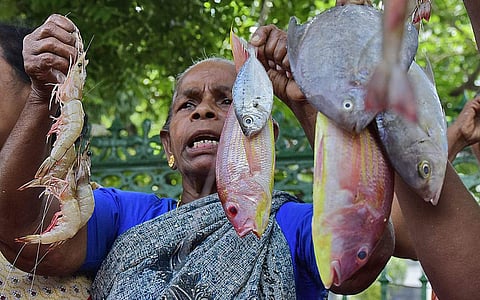

The seizure of nearly 9,600 kg of fish, preserved in toxic chemical formalin, last month has come as a dampener for traditional and small-scale fishermen in Kerala.
Following the formalin scare, fresh catch is being procured by middlemen at an alarmingly lower rate. The fishermen who were selling mackerel fish for Rs 40-50, a week ago, are being forced to give them away for a meagre Rs 2. The soaring oil prices are also adding fuel to the exploitation of fishermen by both wholesalers and middlemen.
"For the last one week, our vulnerable situation has been encashed by middlemen who buy products at a nominal rate. The fish thus procured are usually preserved and sold back when the prices go back to normalcy. Every day we have to spend around Rs 3,500-4000 for venturing into the sea. It is disheartening for us as we are not even able to get back Rs 500," says Napolean Louis, a fisherman from Pulluvila.
Lack of support mechanisms or famine packages from the government during distress period is a serious problem being faced by the fishermen community. "Government bodies such as Matsyafed’s intervention should be enhanced and the agency should directly take part in the auctioning of fish in all harbours across Kerala. Such efforts should be done at least during crisis situations," said T Peters, President, National Fish Workers Forum.
“Currently, this is the harvest season, and we generally expect some good returns during this period. But this year, owing to the Formalin scare, there is hardly any demand for fish. People with vested interests are spreading rumours to make people believe that the entire fish being sold in the state is poisonous,” said Mariadora, a fish vendor from Kollam.
"The rumours being spread against traditional fishermen are baseless. There is a strong lobby of poultry owners and online fish-sellers working behind such rumours", said T Peter.
Lack of effective checking at toll gates and railway stations also poses a major hurdle to prevent adulterated fish in the state. According to Charles George, President of the Kerala Matsya Thozhilali Aikyavedi (Kerala Fisheries Workers Union), "A collaborative effort by health, food safety, fisheries and Local Self Government departments can settle the issue to an extent. Effective check on formalin usage has to be started from ice-manufacturing stages."
In order to counter the rumours, a group of fisherfolks from the coastal area held a demonstration in front of the Secretariat by cooking and serving fish delicacies to alleviate fear among the public.
Following the series of demonstrations, the state government has ensured stringent punishment by reforming Kerala Fish Auctioning, Marketing and Quality Control Bill. The legislation, which is expected to revamp the methods of sales and marketing is slated to be presented in the next Assembly session.
Kerala Fisheries Minister J Mercykutty Amma had earlier told NIE that as the proposed Bill enlists stricter penalties for the miscreants, unhealthy practices in the fish sale could be rooted out. “With the FSSA having certain limitations, what we envision under the Kerala Fish Auctioning, Marketing and Quality Control Bill is to introduce penalties including a fine of Rs 1lakh to Rs 2 lakh or imprisonment or both in cases of using adulterant substances in fish. Only such stringent provisions could address the menace to a certain extent,” said Mercykutty.
The Food Safety Department had launched 'Operation Sagar Rani' last month with the special focus on fish stock, following a directive from the Health Minister K K Shailaja in this regard and a total of 21,600 kg of fish with formalin had been seized after kickstarting the initiative.